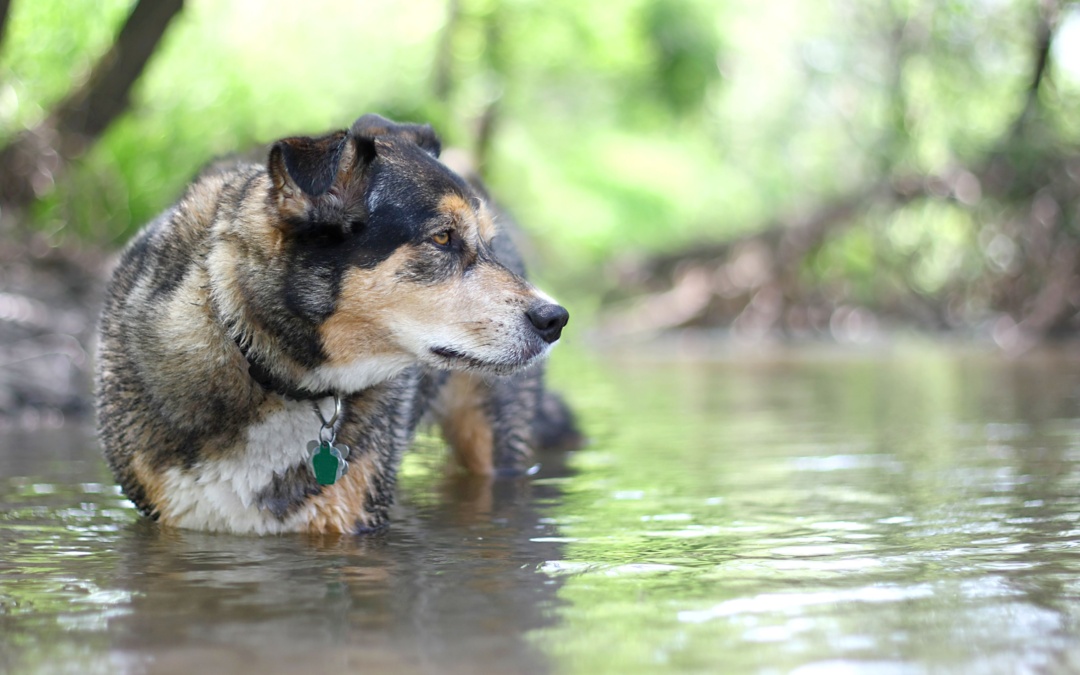The long summer days can be full of fun for pet parents. But for dogs and cats, it can also be a perilous time. Understanding the potential dangers can help you protect your pet from accidents and injuries and hopefully ensure your summer is a happy one for the whole family.
Here are some of the most common summertime pet health dangers our 24/7 emergency veterinary team sees:
Hot Cars: Never leave your pet alone in a parked car for any length of time. Even parked in the shade, with windows cracked open, the inside of a car can quickly reach deadly temperatures. Leave pets safely at home or bring them straight home from an outing before heading back out to run that quick errand.
Heatstroke: Pets can overheat more quickly than you might imagine, even on days we’d consider cool. Remember, they’re already wearing a fur coat! Exercise only during the coolest hours in the morning or evening, and otherwise keep pets indoors or under shade. Offer plenty of clean drinking water. Pets with heavier or longer coats, and those who are overweight, older, or have short snouts (Pekingese, French Bulldogs, Pugs, Persian cats, etc.) can overheat faster than other breeds, so be especially cautious with them. Signs of heatstroke include excessive panting, bright red gums and tongue, lethargy, vomiting, and diarrhea.
Swim Safety: Not all dogs naturally know how – or like! – to swim, and like us, they can succumb to strong currents and rip tides. Exercise extreme caution and watch closely for signs of distress if your dog ventures into water above their elbows. Make sure backyard pools are safely enclosed, or keep your pet leashed around them. If your pet goes under the water or experiences a near-drowning, get them to a veterinarian quickly. Dogs can inhale water into their lungs and experience “dry” or secondary drowning as a result, even days after they’ve left the water’s edge.
Foreign body ingestion: Some of our pets’ summer “snacks” cannot easily pass through their stomach and intestines, including skewers, chicken bones, corn cobs, tennis balls, and socks. Keep an eye on pets, or keep them leashed, or better yet leave them home during BBQs or gatherings with lots of people and families. Dogs are likely to get into something they shouldn’t when you are preoccupied and socializing. Keep laundry in a closed hamper, and store food and trash well away from prying paws. Common signs that your pet’s eaten something they shouldn’t include vomiting, loss of appetite, nausea, diarrhea, abdominal pain, and lethargy.
Toxicity: We see an increase in mouse and rat poison, lily, and mushroom poisonings in warmer months, among other things. If you think your pet has ingested something poisonous, first call the ASPCA Animal Poison Control Center at (888) 426-4435. The ASPCA may recommend you bring your pet to a veterinarian, but they are able to start a case and recommend treatment based on the toxin, which can help expedite life-saving medical care. Review additional poisoning resources on our website.
Noise Aversions: Summer thunderstorms and fireworks can terrify some pets so badly that they’ll become frantic and injure themselves. You can’t stop the sound, so how can you help? First, keep pets secured in an interior room (the fewer windows, the better), preferably in a crate covered with a heavy noise-muffling blanket. Also, consider turning on a white noise machine to see if that provides comfort. If your pet needs more to stay calm, there are garments and wraps available that may help. Talk to your primary veterinarian about the best way to soothe your pet’s noise phobia.
Insect Stings: Dogs and cats that get stung by bees, wasps, and hornets can experience mild to severe reactions, ranging from swelling and skin irritation to anaphylactic shock, vomiting, and collapse. If you notice facial swelling or difficulty breathing, give us a call.
Wild Animal Encounters: We’ve seen a huge spike (no pun intended) of dogs coming in with faces full of porcupine quills, but those prickly animals aren’t the only ones your pet may encounter. Vermont is home to skunks, coyotes, black bears, bobcats, and other animals that you’d do well to avoid. Always keep your dog leashed while on walks or hikes, and keep an eye out for animal tracks or signs that predators may be nearby. Keep a pet first aid kit in your car in case you have a run-in that results in injury.
Burns: While these are less common than other injuries, burns can still occur, either from hot pavement, close encounters with fireworks, or sunburn. Keep pets indoors during the middle of the day, stick to shady areas, and put pets inside if fireworks are anywhere nearby.
If you think your pet may be having a medical emergency, give us a call anytime at 802.863.2387. Due to caseload and limited staff, there may be a longer wait than usual. Please call ahead of time so we are able to advise you on an estimated current wait time. While every pet is important to us, please understand that we must prioritize critical patients first. We encourage you to review our triage priority levels.

